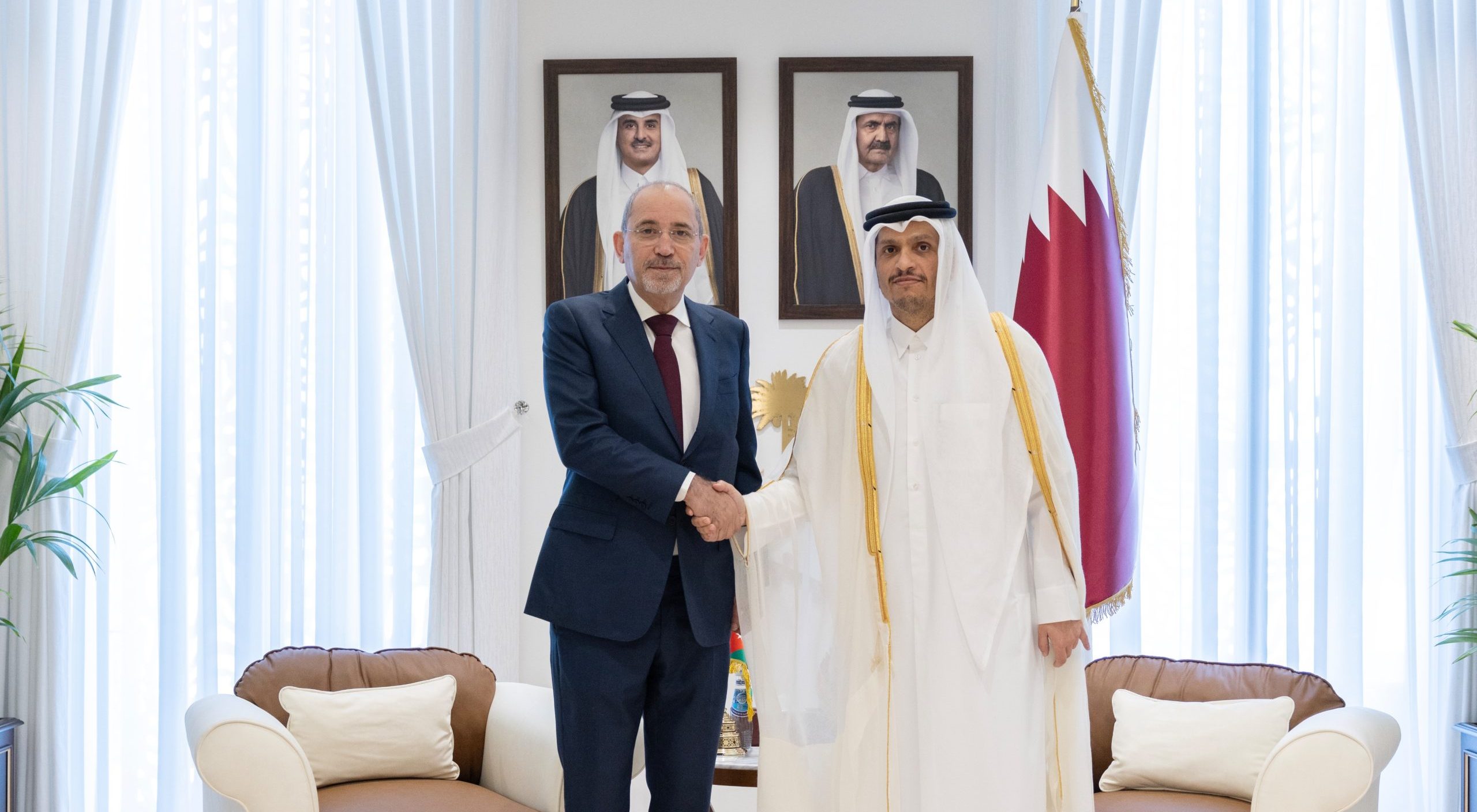Safadi renewed his country’s support for Qatar, Egypt and the United States’ efforts to reach a permanent ceasefire in the Gaza Strip.
Qatar and Jordan have discussed joint mediation efforts in the Gaza Strip while reiterating their calls for an immediate and comprehensive ceasefire amid the ongoing Israeli war.
The discussions took place in Doha on Thursday between Qatar’s Prime Minister and Minister of Foreign Affairs, Sheikh Mohammed bin Abdulrahman Al-Thani, and Jordan’s foreign minister Ayman Safadi.
According to Qatar’s foreign ministry, the Qatari and Jordanian officials discussed the latest developments in the Gaza Strip and “joint mediation efforts to end the war.”
Both sides also emphasised “the necessity of reaching an immediate and permanent ceasefire in the Strip” and developing an effective international position to stop the illegal Israeli measures in the occupied West Bank, including East Jerusalem”.
“The meeting also discussed cooperation between the two countries in confronting the humanitarian catastrophe in the Gaza Strip and ways to bring aid through the Jordanian route and efforts to reduce regional escalation,” the statement added.
Sheikh Mohammed voiced Qatar’s appreciation for Jordan’s humanitarian efforts, especially in working to ensure the entry of aid to the Gaza Strip through his country’s border.
Safadi renewed his country’s support for Qatar, Egypt and the United States’ efforts to reach a permanent ceasefire in the Gaza Strip. The Jordanian official also expressed his country’s support to Lebanon’s security and stability.
During the meeting, Safadi thanked Qatar for “the care it gives to Jordanians who work and reside” in the country.
The meeting comes against the backdrop of joint Qatari and Jordanian efforts that have strengthened since the beginning of the Israeli war in Gaza.
The Gulf state has been a central mediator between Israel and Hamas in hopes of reaching a complete ceasefire in the Gaza Strip, where Israel killed more than 39,000 people.
Last November, Jordan’s King Abdullah II travelled to Doha, where he met Qatar’s Amir Sheikh Tamim bin Hamad Al Thani. Both leaders had called for international action in effectively reaching a ceasefire in Gaza.
During the same month, Jordan cooperated with Qatar and the United Arab Emirates to airdrop aid to a Jordanian field hospital in Gaza in an effort to provide urgent medical assistance to thousands of wounded Palestinians in the Strip, according to Amman’s news agency.
Last month, Qatar Charity sent life-saving food and medical aid to Palestinians in the Gaza Strip through Jordan amid Israel’s ongoing closure of the vital Rafah Crossing since its invasion on May 6.
The four-day initiative took place in cooperation with the Jordan Hashemite Charity Organization with the aim of helping thousands of people, Qatar’s state news agency reported at the time.
Despite sharing ties with Israel, Jordan has taken a harder stance towards Tel Aviv since the beginning of the attacks on Gaza.
On October 27, Jordan proposed a resolution on behalf of the Arab League to the United Nations General Assembly that called for a “humanitarian truce”. An overwhelming 120 nations voted in favour while 14 voted against it, including the U.S.
Then, on November 1, Jordan officially recalled its ambassador to Israel over the “unprecedented humanitarian catastrophe” in Gaza. The kingdom said it would only send back its envoy if Israel halts its onslaught and called on Tel Aviv to recall its ambassador to Amman.
Jordan then decided to not sign a water-for-energy deal with Israel on November 17 over the Israeli aggression on the Gaza Strip.
The Kingdom is home to the world’s largest Palestinian diaspora of more than six million, many of whom have a Jordanian citizenship, mainly due to the geographic distance between both countries.
Many Palestinians had fled to Jordan after the 1948 Nakba, or “catastrophe”, where Zionist militia forced out more than 700,000 Palestinians out of their lands to establish Israel. More Palestinians fled to Jordan during the six-day war of 1967, known as the Naksa or “setback”.
One in five people currently living in Jordan are Palestinian, according to recent data published by the New York Times. More than two million Palestinian refugees are in Jordan.







